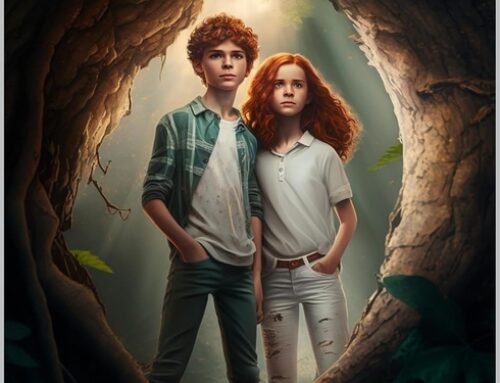
Self-Publishing Review: Your book The Pig and the Box has been downloaded over 1.5 million times, and translated into 15 languages. How did that happen? That’s pretty intense distribution.
MCM: I think it all boils down to the subject matter. At the time I wrote it, there was a controversy about a project called “Captain Copyright,” which was intended to “educate” kids about the sanctity of intellectual property laws. I wrote “The Pig and the Box” as a response to that, which is probably what got it featured on the heavily-trafficked site Boing Boing. It was like preaching to the choir with absurd cartoons. A natural fit.
From there, it took on a life of its own. Two days after I launched it, I got my first translation from a volunteer on the web; less than a month later I was managing eight or nine languages. If I’d had any common sense, I would have made a print version ready to purchase from the get-go, but I honestly didn’t expect it to become as popular as it did. I still get emails from all over the world, from people who want to know if it’s available in their country (sadly, the costs of printing 15 languages somewhat outweigh the benefits).
SPR: So why an anti-DRM book for kids? Obviously the book works on another level – i.e. it’s a story about a pig that gets a cool, duplicating box, which can be enjoyed by anyone who’s never heard of DRM. But do you think this is an important subject for kids to learn about? Or do you see it as a way of making DRM more important to adults by showing that it’s important enough to be put in a kid’s book? Basically, what are your thoughts on DRM?
MCM: Oh, that’s a tough one. I think initially, I wanted to make a book that would help kids appreciate that the basic elements of DRM are flawed and stupid. Treating your customers like criminals and actively trying to interfere with their consumption of your goods is a dumb idea. I thought that if you exposed kids to the idea early, in 50 years when they’re in charge of a company and asked to decide between DRM or an open format, they’ll have an instinctive disliking of DRM. “I don’t know why, Larry, but putting locks on this album makes me feel like a dirty pig…”
But what I realized was that most kids didn’t really need to be told that: they get where it’s going from the start. Most kids are taught that “sharing is good,” so they read the book as if I’m stating the obvious in a funny way (as with any other moralistic story). There’s no real learning going on, because it’s built-in. It’s the ADULTS that need that (re-)instruction, and I think it helps to have them read it like a fable, so they can see the kind of hypocritical position they put themselves in when they support DRM. And if they didn’t have an opinion either way, I think it helps them make a choice, because it really does boil down to a simple equation of greed vs civility.
(My opinion of DRM is pretty straightforward: it doesn’t work, it’s a punishment to honest customers, and with all the time and money wasted on implementing and defending it, we could have come up with great new business models instead. I think the sooner the creative industries give up on DRM, the better. It’s 21st century snake oil.)
SPR: How did you get the post on Boing Boing and the Cory Doctorow quote? Are you finding that this is a book that parents are getting for their kids, or is it mainly marketed to adults via BoingBoing-type sites? Like has it become a kind of DRM-parable Animal Farm. Are you marketing the book via children’s books websites as well as a place like Boing Boing?
MCM: The first post to Boing Boing I just did for the hell of it, in case it worked. Strangely, it did. A few months ago, I wrote to Cory and asked him if he would mind giving me a quote for the back cover, because he’d really been the one who had started the ball rolling. He wrote back pretty much immediately, and made me promise to keep him up to date on the second edition, which came out at the end of January. I wouldn’t presume to call him a “fan”, but he’s definitely a patron of my arts, as it were.
In terms of marketing, it’s a funny split persona. I know I get a lot of sales from adults that want to teach their kids about the DRM issue, but I try and sell it as “a book for kids” before anything else. I’ve done some readings around town, and it does quite well without the ideological undertones.
However, that doesn’t seem to translate well when it comes to more general marketing: there’s a strong anti-self-publishing sentiment when it comes to books aimed at kids. Most sites or publications I’ve approached have turned me down, and two explained it was because they feared that a book that hadn’t come from a major publisher might contain unsuitable material, and they didn’t want to be responsible for it. So in a lot of ways, it’s been an uphill battle. I’m stuck marketing to techno-parents because I don’t have many other options. Not that it bothers me too much, but I do wish I could try to break out of that niche.

MCM: I’ve tried to hide the fact that it’s self-published, but I think most sites check up me and call my bluff. Another strike against me is exactly what helps sell to techno-parents…the anti-DRM angle. I suspect a lot of children’s book people don’t understand the concept of DRM, and assume I’ve written some kind of Anarchist Cookbook to corrupt young minds (“turn the book upside-down and the crazy squirrel shows you how to make a bomb out of toothpaste, kids!”)
The books for adults so far have been a bit of a screw-up on my part…they’ve got cartoony pictures of a duck and a fish wearing Victorian clothes, which I think makes people think they’re meant for kids when they’re not. So I created my own marketing nightmare right there. They do well with the pre-existing audience, but it’s a real pain to advertise 🙂
But yeah, promoting a book for kids in the self-publishing world is very hard. With adult books, there’s the notion that “traditionally published” = quality of work… but when you’re talking about picture books, it’s not just quality… if you don’t have a recognized logo on your cover, people assume you’ll end up damaging their children. There are assurances with a Scholastic logo that you can’t replicate, no matter how hard you work. So you have to put most of your attention into getting your fans to promote you with word-of-mouth, because it ends up being your only choice.
I don’t really expect to make much headway with marketing my children’s books, but I keep trying, on the off chance I find some success. I know “The Pig and the Box” plays well for kids, but getting that chance is a very tall order. I am considering having my daughters switch schools every two months so I can create an artificial grassroots support network. It might just work…

MCM: I have two writing personalities, I think. I do a lot of stories that are plainly for kids, and I love every minute of it. But at the same time, I am writing adult-aimed fiction (I have a SF novel coming out later this year, along with an interactive serialized novel that I’ll be kicking off in a few months). I could easily lose myself in the adult fiction, but then I get the itch and need to do something silly and light, and then I trend back towards picture books. I realize I don’t have much cred in the grown-up market at the moment, but I’m hoping to change that perception this year.
The Virus Coder’s Girl was the first step in that process. It’s sort of a prologue to my SF novel, set in the same kind of world, with the same tone. It’s done very well on Shortcovers.com (I wasn’t sure how to release it until Shortcovers launched), and I’ve had another few hundred downloads from my site directly. I really enjoy writing short stories, but I don’t usually have time to get them out the door… hopefully I can squeeze another one in before July, and see how the $0.99 purchase price on Shortcovers works.
SPR: What’s Rollbots, and how did you come to create as huge a project as that?
MCM: RollBots is my animated series, about a race of spherical robots in a roller coaster city in the sky. I was in a toy store in Japan with my family and I saw this giant set-up with marbles rolling on twisting tracks, and behind it were these old-school Transformers toys on display, and I thought: “If you put this and that together, it’d be pretty cool”. I contacted an old friend who works in the animation biz, and he basically shepherded it into production. Four years later, and it’s airing on YTV in Canada the CW4Kids in the US (soonish) and we’ve got toys being developed by Mattel.
The funny thing for me was when the second edition of “The Pig and the Box” came out, and on the cover it says “from the creator of RollBots”… I got a few snarky emails about that, with people saying “nobody’s heard of RollBots you idiot!”… but that was pretty much the point. People saw it as me trying to promote my book with my show, but really, I was trying to promote my show to the readers of my book 🙂
One thing I’m finding is that my self-publishing adventures are making me a lot less patient with the animation world. It took four years from idea to airing for RollBots, so when I come up with new ideas that might work as a series, I always seem to pause and think: “would it just be easier to do this on my own as a book?” Between the glacial pace and the creative concessions (which can be good, but can also be really bad), I find it’s hard not to give up on the “pro” route and do it myself. That’s a big part of my next book/project, TorrentBoy (March 25)… having “franchise” fun without all the boring stuff. Can’t wait to see how it goes…
SPR: That’s interesting because a major reason to self-publish is to avoid the slog of submissions and waiting for other people to do their jobs. But if Rollbots takes off, that could lead to bigger things for your kids’ books. Would you ultimately like your kids’ books to be released traditionally? If Rollbots becomes popular, that’s certainly possible. Or do you like the idea of releasing these books yourself? Did you try to get your books published traditionally first or did you go straight to self-publishing?
MCM: I never actually tried to do it the traditional way. I thought about it, but it seemed like I would be signing myself up for more of the same. I come from a dotcom background, so I think I have a very do-it-yourself mindset that doesn’t do well in corporate structures, whatever they may be. I’d rather be bootstrapping on my own terms than dealing with multiple levels of managers to get permission to sneeze.
If RollBots becomes hideously popular, I would still rather do my own books. I like the freedom of coming up with an idea, writing it, having it torn apart in editing, and getting it out the door within the month if I choose. Part of it is my general lack of patience, but it’s also a nagging belief that the traditional publishing model is broken, and it’s only the smaller players that can really figure out the solution. So I’m throwing my ideas against the wall and seeing what sticks. Really, all this is far more entertaining than getting a book deal anyway.
If I’m lucky and RollBots hits it big, it’ll be interesting to see how those same children’s book publications deal with my stuff…will I suddenly have credibility because of my peripheral work, or will the self-published label still make me untouchable?
SPR: My guess is the former. What’s great is that you have a day job that’s a creative outlet, whereas a lot of self-publishers are looking to hit it big as a writer so they can break away from normal work. So you’ve got a lot more freedom. If Rollbots hits it big, are you going to pour a lot more resources into your books? What’s your fantasy for promoting your books, in terms of advertising and distribution, and how do you hope to achieve that?
MCM: Yeah, it’s true that it’s usually a slog, which is why I feel like I need to work at cracking the self-publishing nut on behalf of those that don’t have my freedom. I mean, it won’t be a clear path from start to success, but I’m hoping I can at least chart the pitfalls so others don’t have to waste their time on techniques that don’t work.
If RollBots was big and I had a lot more resources? It’s a tricky situation. I’m committed to approaching this with the “I have no money” angle, so even if I had a million dollars, I don’t know if I’d spend it, because it would skew my results (“step four: buy a full-page ad in the New York Times for $164,000”). But my fantasy would be to be able to buy access to shelves in actual bookstores, which is very hard to come by for self-publishers. I’d love to be able to have a front table set up with a pile of my novels, with a little cardboard stand and everything. It’s funny, because once you achieve a certain level of presentation quality, it doesn’t matter if you’re self-published or not. It only matters to the gatekeepers. If I could GET there, I’m sure I could compete with the big-house books. So my ideal situation would be to get my novel in physical stores, so it has a chance to pick up browsing traffic.
Right now I use Lightning Source for my printing/distribution, so I’m already theoretically able to get placement all over the world… it’s just a question of convincing the chains to stock me. I actually don’t know if that would really improve sales, but I’d really curious to see. Part of me wants it to fail miserably, just so I can report that no, getting special placement in your local bookshop really doesn’t do a thing for you.
If I had a lot more money, I’d hire a staff to figure out the nitty gritty marketing stuff for me. And maybe a full-time editor. And someone to tie my shoes for me. That would be fun.
SPR: How’s your beta testing program been? Got good feedback from it? Something you recommend for other children’s books authors?
MCM: Oh, it’s great. I’ve sent a bunch of books off at various stages, and received tons of interesting comments. I try and get people with kids to tell me when it is that they kind of doze off or lose interest, and that’s where I know I’ve got a problem. It’s much more efficient fixing those things at the start, rather than waiting for the editor to see it. Also, I find editors don’t necessarily notice those types of problems, so you end up with a very polished but flawed piece of writing.
I think the beta testing program is great a process for any author, actually. You are giving a select few people a bit of a sense of ownership of you work (which usually translates into some dedicated fans when you release it), and it tells you what you need to fix. I guess if you’re Stephen King, you probably don’t want to risk doing something like this, but for me, it’s like a dream come true!
SPR: Cool, so what’s in your future for writing and publishing, and what main advice can you give to people who are looking to self-publish, whether it’s a children’s book or something else?
MCM: Well, I still have 10 books to go in my “12 Books in 12 Months” event, the next one being “TorrentBoy: Zombie World!” I’m really excited for my novel, too, because it’s a whole new adventure for me. I have a few more surprises in store for 2009, so stay tuned!
Advice-wise, the most important thing is to know who you are what who you’re selling to. If you’ve got a solid following to start, you can afford to forgo broader distribution and focus on your existing fans. If you’re completely new, you should look into how to get your book into as many hands as you can, which may mean compromises on your creative vision, so you have more mass-appeal. Then have someone edit your work until it makes you cry, and get it out there for people to see. A great idea’s not great until someone else has read it. Self-publishing doesn’t mean you’re not trying to sell your writing, it means you’re selling directly to the audience, and have no one to blame for failure but yourself.
Also, use a nice serif font at a legible size. There is a special place in Hell for people that break that rule. I am not kidding.
SPR: Great interview, MCM. Good luck with Rollbots, the children’s books, the novels, and everything else.
Get an Editorial Review | Get Amazon Sales & Reviews | Get Edited | Get Beta Readers | Enter the SPR Book Awards | Other Marketing Services






















MCM what does it mean?